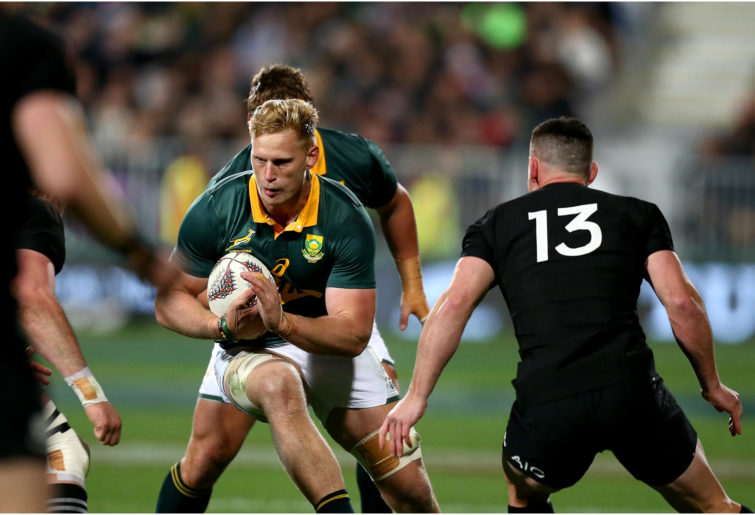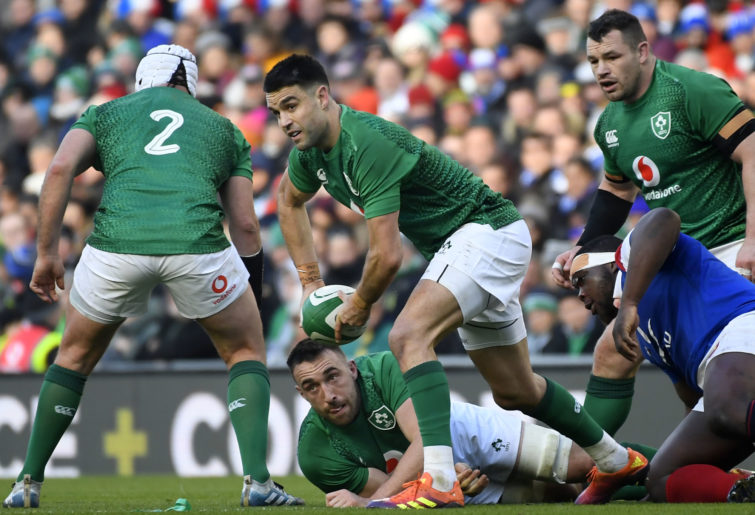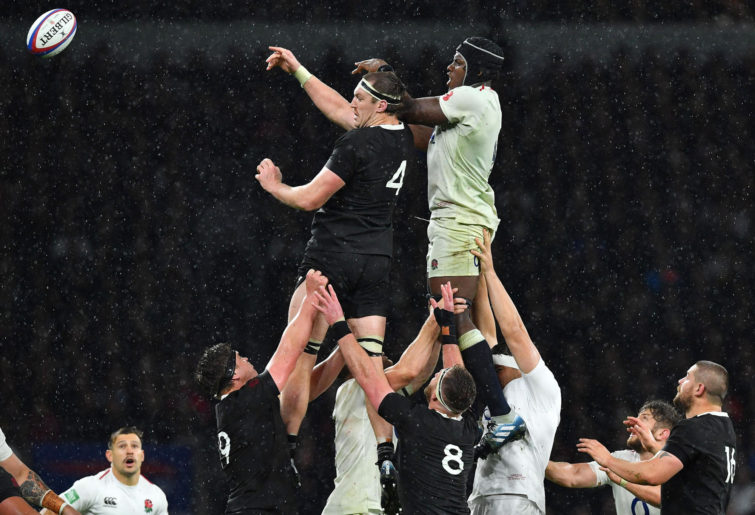Wales, New Zealand, Ireland, South Africa, England and Australia have identifiable paths to winning the William Webb Ellis Cup.
Three of these teams appear – key word – to have the depth needed to win six or seven matches in a compressed tournament on fast tracks in what may be a steamy Japan: the All Blacks, England and the Springboks.
If they can keep their top players on the field, Ireland and Wales can go all the way.
And the Wallabies? They have a puncher’s chance.
Most oddsmakers have the All Blacks as odds-on or better, with South Africa and England at four or five to one, Ireland and Wales hovering at seven or right to one, and Australia somewhere around 12 to one or so.
Five other teams can play kingmaker or spoiler: Argentina and France will decide who emerges from Pool C. Fiji will probably give the Welsh and Australians all they can handle. Scotland is never an easy quarter-finalist to oust. And the host nation is known for upsetting the form card.
But the truth is, this unbelievably physical World Cup is contested by teams with depth: it was the beaten Boks, not upstart Japan, who were within two points of beating the All Blacks in the 2015 semi-final, and 2019 will probably be no different.
Wales
The world’s top-ranked rugby team will go to Turkey for hot-weather training before beginning their World Cup campaign in hot and humid Toyota (highs of 35-38 degrees, average of 12 days of rain in September) in late September against the rugged Georgians.
Six days later, the Dragons take on up-and-down Australia in Tokyo on a Sunday. Warren Gatland’s team will have ten days to prepare for a bruising battle with Fiji in the southern town of Oita, which will almost definitely decide whether Wales faces England in a quarter-final. Then, Uruguay.
Gatland famously said last year that his team had forgotten how to lose. England reminded them recently, and Wales would prefer to face France or Argentina in an Oita quarter-final.
One would think Wales will be favoured in all Pool D matches, even if they have found a wide variety of ways to lose to the Wallabies at the death over the decades. It’s not difficult to imagine Samu Kerevi blowing Hadleigh Parkes off the park, or Rory Arnold destroying a crucial maul, or Kurtley Beale and James O’Connor doing something improbable after making a hash of something just before. The Davies-Biggar combination won’t set the World Cup on fire, and Ross Moriarty is no Toby.
Still, Wales has a nucleus of world-class players who should see them through tight tussles with the Aussies and Fijians. A back line featuring Liam Williams, Jonathan Davies, George North and Josh Adams is difficult to roll over, and Leigh Halfpenny can still punish indiscretions from afar.
It’s just that it is impossible to see Wales handling an Alun Wyn Jones injury the way, say, the All Blacks can shrug off Brodie Retallick’s shoulder or the Springboks could replace a dinged-up Eben Etzebeth. After all the loose forwards lost by Wales in the last 12 months, it is simply an existential reality: they cannot afford to lose Aaron Wainwright or Josh Navidi. And that sounds weird.
So the problem for Wales is depth. Lady Luck is arbitrary. If two or three more Welsh stars are hobbled by Georgians and Fijians, their top-dog status will look overblown. Jonathan Davies, Williams, Alun Wyn Jones, the Chris Boyd-tutored Biggar (at Northampton), and their dwindling corps of loose forwards simply have to stay healthy for Wales to be a semi-finalist again.
They will feel confident if a semi-final is against the blunt but brutal Boks – less so if they face Steve Hansen’s clever crew. But my tip is Wales won’t have the legs to stay with the All Blacks’ halfbacks, fullbacks and wings in a semi-final.
Nor have they actually played the real Boks in recent years: the DC Test was exhibition footy, and the weary end-of-year squad limping into Cardiff will bear scant resemblance to a rip-roaring Boks team armed to the teeth with nastiness and speed, who may have also forgotten how to lose.
Outlook: winner of Pool D but not with blow-outs, a comfortable quarter-final win, ending as a badly beaten semi-finalist with injuries the explanatory narrative, but in reality, a lack of depth is the well-known flaw going in.
New Zealand
The second-ranked team in the world, but the true favourite, has had the good and bad fortune to draw their old foe – the fourth-ranked Boks – in Pool B. The bad news is obvious: in the last four matches, the outcome has been decided by a last-minute score, and the winner felt lucky each time.

(AAP Image/ David Rowland)
The good news, as Geoff Parkes has pointed out, is the finals usually feature a one-loss team, and an early loss will not matter much in the grand scheme of things, because Pool B is so top-heavy.
Lose to the Boks and they won’t see them again, if at all, until November in Yokohama. A win is only going to make one match harder: a quarter-final against bigger Celts or smaller Celts. But I suppose the Boks don’t see it that way, and Steve Hansen will not want to prolong the shakiness.
So expect a real humdinger in Yokohama on the opening weekend of the tournament. The bookmakers will have the Kiwis narrow favourites, with the depth and the time (ten days before they play Canada) to recover from the speed and power test these bold Boks will give them. The Namibia match will be a welcome respite, and then the All Blacks close out with Italy in Toyota.
Beau’unga looks to be the back line poison Hansen has picked, but in reality, the two-headed monster the field should really fear is Smith-TJP at the base of the scrum and ruck, with their one-two punch of style difference. On fast fields in Japan, their two-second ruck clearances and whip passes are going to pose everyone problems. Look for a mysterious increase in points scored!
But let’s be clear: the All Blacks’ recent stumbles are all down to the pack. Dane Coles is having trouble seeing past the red mist, the Guzzler was RG’ed by the Abominable Snyman and New Zealand lock stocks are not overflowing, a couple of loosies are battling Father Time, and attacking rucks have not been as clean as they used to be, because the tough old Crusaders props look tired.
The pack will be back. Ardie Savea is only rivaled by Pieter-Steph du Toit and Pablo Matera for best loose forward in the world. Before any Northern Hemisphere fans get outraged, please include consistency, durability, adaptability, match-winning, and 80 minute-ness.
Sam Cane continues his remarkable Laureus-worthy resurgence from near-paralysis, and Kieran Read seems to have rediscovered his mongrel. Brodie may miss the Bok bout, but he’ll play in the final.
Outlook: no matter how the All Blacks do in the first match, they’ll be there at the end. Ireland or Scotland will be swept aside in the quarter-final, and they’ll be hitting their straps in the semis. Their pack will man up, but it’ll come down to magic moments or Mo-mistakes by a playmaker.
Ireland
Public message: we love playing the All Blacks!
Private reality: we must avoid playing them.
Go back a year or so and read all the rhapsodic odes to a new era of Irish-Kiwi dominance at the Cup. In reality, Ireland faces the very same question as they ever have: can we finally win a quarter-final at the World Cup? The way England and Wales swatted them aside is the issue, not just the losses.
But Joe Schmidt didn’t win three Six Nations Championships, a Grand Slam and two victories over New Zealand by being a bad coach.
At least knock-out qualification is still a sure thing, unless Japan can pull two upsets out of their hat. Look, Ireland will put a strong pack on the field in Yokohama to play their Scottish rivals, and Johnny Sexton is a canny operator. This match will be on the opening weekend, as well, but after the Pool B match between South Africa and New Zealand.
Will Gregor Townsend and Schmidt not have a wee thought of strategic loss. Have we come to that, yet?
If a win will open a path around New Zealand, Scotland won’t just lie down for Ireland. They came back from 0-31 at Twickenham, with high-octane tempo and solid foundations. Finn Russell and Stuart Hogg can open any team up, even Ireland. But Scotland’s pack remains a weakness against the top-five teams, and Ireland should be able to stifle the Jocks, who looked fragile against the French. Ireland plays Japan a week after their opener, in what should be a rousing patriotic spectacle, near Mount Fuji, at the site of the first shogun.
Then they can play dirt track against Russia, before a battering Samoa threatens the depth of their physios and bandages. The good thing about this Irish draw is the tough matches are a few weeks apart.
Ireland’s shallow player stocks were exposed in the 2015 World Cup, leading to sound defeat by Argentina, but Schmidt has built a bit more depth. Jacob Stockdale and James Ryan are two of the best youngsters in world rugby.

(DAMIEN MEYER/AFP/Getty Images)
Sexton and Conor Murray have the nous to guide the team along the path to finally break through to the semi-finals, but knowing it is the Boks or All Blacks who stand in the way means (a) the pack simply has to remain healthy, and (b) they’ll need luck to finally exorcise the ghost of Michael Lynagh’s late try in 1991.
Outlook: Ireland goes home after the quarter-finals, unfortunately, again due to a Southern Hemisphere player who does something heartbreaking late in the game that Ireland just cannot stop, but does result in that player getting a very nice contract in Dublin next year.
South Africa
Rassie Erasmus has a couple of fast, nasty, street-smart packs to staff his challenge on the Cup. Go through all the forward positions, and the only starting jerseys which have a single obvious incumbent are Pieter-Steph du Toit’s and Malcolm Marx’s, yet many other names are household and would challenge for a place in any pack: Beast, Steven Kitshoff, Eben Etzebeth, Duane Vermeulen.
Tight-five back-ups are plentiful and quality. The only real question is if Siya Kolisi’s knee can survive, but if not, there are four seasoned Bok captains in the pack. These Saffa forwards all know how to clean any ruck situation, seem to be finding the right body position to avoid chokes, but also to dominate in the tackle, and everyone is accountable to their mates.
Another improvement has been Jacques Nienaber’s rush-umbrella defence, which has started to provide real venom from the 13 position, which is hotly contested by Lukhanyo Am and Jesse Kriel, and modest improvement from the wings (Cheslin Kolbe, S’bu Nkosi and Makazole Mapimpi) on reads.
Add Handre Pollard’s top form as a field general and goal-kicker to aggressive and nippy scrum halves and you have a recipe to go far. The caveats are Pollard’s health, a curb on Faf de Klerk’s over-exuberance, fewer line breaks given through the midfield channels, and a miraculous fix of Marx’s wobbly line-out throws.
The Boks have only 17 days to play four Pool B matches, but this is where depth should help. Elton and Herschel Jantjies should have a dominant B-side pack to handle Namibia and Canada, and Pollard and De Klerk should see their pack outmuscle Italy. South Africa have not required many visits to opponents’ red zones to score lately – the Boks will score tries in RWC 2019.
Outlook: the first match, because Brodie is out, is a toss-up. But the Boks will handle either Celtic tiger with an edge in pace. If the history of South Africa-England match-ups are studied, there is no current semi-final scenario that looks like derailing a rematch with the All Blacks, and again, that match – if it looks like the form book – will be a toss-up. Or the horrible 2017 Boks could resurface.
England
The set-up of the competition is helpful for England (cue conspiracy theorists). Pool rivals France and Argentina will begin proceedings in Tokyo on opening weekend, while the Poms size up Tonga and the USA, allowing a full shuffle of players.
England only play Argentina on 5 October and then France a week later. They will know precisely what is needed, and surely will have a scrum to batter the Pumas.
No team has won a World Cup without high-quality locks, and England has a glut. Bullies, ponies, sky-walkers, yeomen, and all.
England dismantled Ireland in the 2019 Six Nations by running their bulls into Ireland’s calves, and it was scary. Nobody enjoys tackling Maro Itoje, Kyle Sinckler, Billy and Mako Vunipola at full steam, although Wales has shown a blueprint on how to blunt it. This is a big worry because Wales could be Eddie Jones’ quarter-final opponent.
It is possible to force England into penalties. You can win an aerial battle against them. In the breakdown, England sometimes lacks focus. Their driving maul punches below its weight, but maybe that is Jones holding a few face cards back.

(Photo: Ben Stansall/AFP/Getty Images)
But they won’t lack confidence: they’ve owned the Wallabies recently, and troubled the All Blacks and Boks. And they have that precious commodity: depth. Anthony Watson is vying with Elliot Daly at fullback. The Sweet Chariot can lose four starters without bogging down.
The thing is, though, England seems even less consistent than South Africa, and a lot less consistent than Wales. At peak, this outfit could really hum, and they can handle adversity. They have a coach who is adverse to them! But all in all, England is a legitimate contender.
Outlook: almost a certain semi-finalist, but how sweet would it be if Michael Cheika had his revenge on Eddie in a controversial quarter-final, with both coaches damaging doors, walls, and themselves? I’ll say that England just fail to make it to the Big Dance, because in rugby, nice guys do win. Apologies to Joe Launchbury and Chris Robson, a.k.a. the Exceptions.
Australia
If the Wallabies can channel their inner Perth, defeat Fiji in the Sapporo Dome, and eight days later break Welsh hearts, there is a path for another run to the final, which involves avoiding England, beating France or Argentina, and then probably both of their old Tri-Nations friends or a delicious pathway of beating one of the Boks or All Blacks and then beating England. It’s a hard road. A rocky path.
Hence the long odds.
But the beautiful thing for the Wallabies is Wales is their old bunny, and who have they played more often than New Zealand, South Africa and England?
The problems are well known. Australia has no tactical kicking game, which means they battle for sustained territorial dominance, and given that they don’t have big bruisers to dent a defensive line before spraying it out to non-existent fliers, they simply cannot seem to score a lot of points without magical dry conditions and no knock-ons and hard lines run with perfect hands a la Bledisloe 1.
Outlook: the Wallabies should beat Fiji, and might even shock the Welsh, but even if the form book holds and Australia is in the loser bracket, they can pull an upset. If so, it’s an old Tri-Nations! No pressure, really.
This might set up some lovely Wallabies lore, but in the end, it seems like kicking woes might be the final problem.































































































